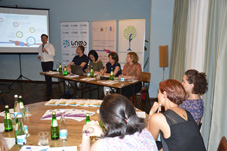
Effectiveness of the vocational education and employment programs for persons in conflict with the law
Friday, July 20
Civil Society Organizations - Civil Development Agency (CiDA), Georgian Farmers Association (GFA) and DVV International held a research presentation and presented analysis of the effectiveness of the of the vocational education and employment programs for persons in conflict with the law.
The research provides overview of the current situation on the labor market in Georgia, the current state of vocational education and ongoing reforms (including Dual Education and its related international experience), as well as existing employment programs.
The research revealed that vocational education is provided to prisoners based on modification of the state vocational education programs. As a result, programs are short-term, with the duration of mainly 3 months, which is not sufficient for acquiring skills for the majority of professions, however, useful for maintaining and developing qualifications. In addition, short-term programs in penitentiary institutions are more convenient for frequent movement of prisoners and limited teaching capacities of the institutions.
The research reads that commencement of vocational education programs for people in conflict with law is being delayed due to the multilayer approval procedure of the programs, which causes the loss of interest of the program beneficiaries towards professional programs. Another reason for delaying programs is the necessity to form the groups of at least five people to run the course, which is not always possible due to difficulties in forming mixed groups.
,,Motivation of involvement of beneficiaries in educational programs is low due to factors such as the fear of beneficiaries and complex towards learning and teaching process coming from the lack of general education, employment prospects and distrust towards the penitentiary system,” says Nino Demetrashvili, Project Manager of CiDA.
“The main obstacle to the employment of former prisoners is existing stigma in the society; most of the employers are not willing to employ a person with a criminal past, regardless his profession or qualification,” she adds.
The research has been conducted within the frames of the project “Training and Employment Support Initiative in Criminal Justice Sector” (TESI) with the support of the European Union.



